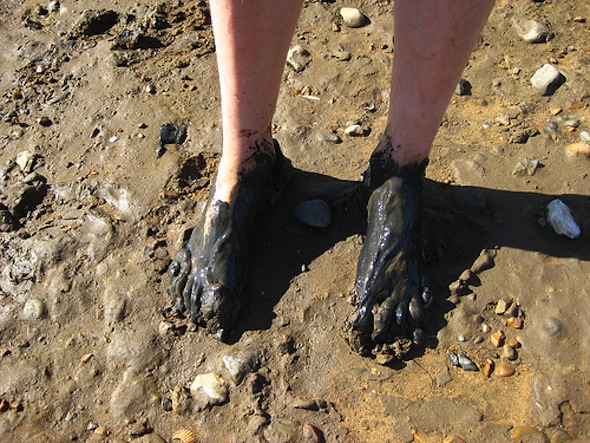Our western civilized world is in the midst of an autoimmune crisis. We have so successfully scrubbed and sanitized our world, that we are exposed to much fewer microorganisms than our ancestors. The Hygiene Hypothesis proposes that our immune system evolved in circumstances that allowed it to be exposed to many different microorganisms, some benign, some not. These constant and continuous exposures challenged the immune system to evolve and develop properly. With the relatively sudden drop in these exposures, the immune system cannot develop properly and autoimmunity and inflammation are the consequences.
The Hygiene Hypothesis is born
In a study published in the Lancet in 2001, it was reported that children in large families and especially those that grew up on farms were less likely to develop hayfever. It was postulated that early exposure/infection with the multitude of microorganisms one would find on a farm, and also from other siblings, would diminish the incidence of hayfever.
In 2002, a study published in the New England Journal of Medicine found that children exposed to endotoxin (microbial components) develop a tolerance to external allergens — that is, they were protected against allergies and asthma.
A study published in Science in 2002, found that long term helminth infection induced elevation of anti-inflammatory cytokines and this was inversely correlated to allergy. In other words, long term helminth infection resulted in fewer allergies.
With sanitation and sterilization come autoimmunity
It makes perfect sense to me. With modern hygienic practices like refrigeration (that removed the need to ferment foods and ingest beneficial bacteria that way), sterile drinking water, modern housing and sanitation systems, and certainly antibiotics (that kill all the flora in the intestine, not just the trouble makers), we have removed many sources of microorganisms, both beneficial and disease causing.
Allergies, inflammatory bowel disease (Crohn’s, ulcerative colitis and celiac) and other autoimmune diseases are much more common in the western world as compared to third world countries. People in third world countries may suffer from acute microbial induced diseases like, cholera and dengue fever, but they do not suffer from chronic inflammatory and degenerative diseases like MS or inflammatory bowel disease.
We are walking ecosystems
A study published in 2009 in Immunology, demonstrated that we do indeed coexist with microorganisms and our immune system has been shaped by them. It suggests that the most important class of organisms, in terms of their impact on us, are helminths. That they in particular have driven the evolution of the human immune system. In fact, this paper suggests that we have been shaped in fundamental ways by coevolution with helminths.
Because of modern sanitation and technology we have eliminating typhoid and cholera and have saved millions of lives, since sewers and clean drinking water were introduced in North American and Western Europe. But in doing so, we contributed to the rise of the modern diseases involving immune dysregulation, like multiple sclerosis, Crohn’s, ulcerative colitis, Graves disease, Hashimoto’s thyroiditis, Type I diabetes, asthma, allergy, celiac disease, and Sjogren’s syndrome to name just a few.
We have many different types of organisms living with us — that have been there for over 10,000 years. They include the commensal and pseudo-commensals such as lactobacilli, many actinomycetes species as well as mycobacteria.
What are the helminths?
These organisms that used to live symbiotically inside our intestines, but have been eradicated due to modern living, are, in fact, worms. Now don’t feel disgusted — you won’t see them, mainly because they are not there. But emerging scientific investigations of helminths provides us with some information as to their importance. My goal is that by the end of this post you will feel very friendly towards these worms and you may even be inclined to call them old friends.
Modern life has damaged the global ecosystem as well as the individual ecosystem
All of our advances in technology and modern living have damaged our global ecosystem. We are losing rain forest at an alarming rate, species are becoming extinct, there is global warming and acid rain.
We have done the same type of damage to our inner ecological systems. We do not get beneficial bacteria in our food due to refrigeration. We do not get exposures to worms because we do not walk barefoot on the ground due to shoes, cement sidewalks and roads. (We also do not get the benefit of being grounded — but that is another post).
Autoimmunity and inflammation go hand in hand. The immune system over reacts to what is perceived as a “foreign invader”. Through the release of chemical messages, the troops (white blood cells) are called to respond to the invasion. In the case of autoimmunity, the troops mistakenly attack normal tissues and T regulatory cells are not doing their job of controlling the attack. Inflammation and tissue damage is a consequence.
What do the worms do?
The helminths seem to drive activation of the regulatory parts of the immune system. They can affect regulatory dendritic cells, regulatory macrophases and regulatory type T cells and cytokines.
Helminths induce a strong TH2 response with cytokines IL10, IL4 and IL5. These cytokines activate macrophages in a different way from a TH1 response. The TH2 response balances the TH1 response and thus prevents inflammation from developing.
Inflammatory bowel disease
There are several mechanisms of action from the helminths that are currently being studied. They all appear to protect lab mice and rats from induced colitis. These animal models exhibiting IBD appear to be protected by several species of helminths.
It has been postulated that the helminths secrete substances that affect immune system cells such as the dendritic cells.
It has also been suggested that helminths rapidly shift the abundance and distribution of some intestinal bacteria. There is a prominent increase in the lactobaccillus family with helminth infection. Various bacterial species within this group of organisms have been shown to decrease intestinal inflammation in murine models of colitis.
Multiple Sclerosis
Patients with MS who have helminth infections (e.g., Trichuris trichiura and/or, Ascaris lumbricoides, Strongyloides stercoralis, and others) have a milder disease course compared to MS patients without helminths.
It has also been shown that this protection is immune cell mediated.
Type 1 Diabetes
Therapeutic trials using helminth exposure in patients with Type 1 diabetes are planned but not yet completed. For several years, laboratories have studied the effect of helminths on T1D using animal models of autoimmune diabetes with the non obese diabetic (NOD) mouse. These studies have been very promising.
Rheumatoid Arthritis
There are no published clinical trials of helminth exposure in patients with rheumatoid arthritis, but the effect of helminths on arthritis has been tested in animal models of this disease. Infection of these mice with bacteria aggravates arthritis, while infection with a helminth (H. polygyrus bakeri or Nippostrongylus brasiliensis) reduces the incidence of arthritis and the degree of synovial hyperplasia.
Allergies and Asthma
While allergies and asthma result from a strong TH2 response, helminths still appear to down regulate this TH2 atopic disease.
Many epidemiological studies support the hypothesis that helminth exposure suppresses atopy, as measured by skin reaction to injected allergens. A study in Gabon showed that children infected with helminths were less likely to react to dust mite allergens than children without the helminths infection.
Helmiths as an emerging therapeutic modality
Clearly, there is plenty of research studying this exciting emerging therapy. It is conceivable that these organisms modulate host immunity through release of immune regulatory products or by display of regulatory molecules. It is also possible that some helminths, release substances that indirectly modulate host immunity through altering the composition of our complex intestinal microflora as noted above.
Stay tuned for more information about the emerging therapeutic modality of helminthic therapy, human trials with helminthic therapy and the movers and shakers in this exciting new field.
Are you now viewing helminthic therapy in a better light? Are you getting excited about this emerging therapeutic modality? I know I am! Leave a comment and let me know!
Resources:
Related articles:
The AutoImmune Crisis: What To Do About It












